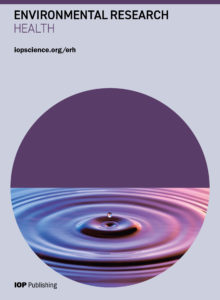ERH特刊征稿|聚焦气候变化适应和减缓与人类健康相关的战略

特刊详情
客座编辑
- Stefania Papatheodorou,美国哈佛大学陈曾熙公共卫生学院
- Caradee Wright,南非医学研究委员会
- Arnab Ghosh,美国康奈尔大学
- Jose Guillermo Cedeno Laurent,美国罗格斯大学
主题范围
Mitigation and adaptation are two complimentary strategies to respond to climate change which is one of the most pressing and complex challenges today. While mitigation aims to reduce the net release of greenhouse gases, limiting the rate of a warming planet, adaptation includes actions to help populations adjust to the current and future effects of climate change and help them avoid their associated health impacts. The Paris Agreement in 2015, to which almost all countries in the world agreed, set worldwide targets for mitigation, however, today, mitigation is not on track to meet these targets. These failures make adaptation strategies even more important.
In this focus issue, we aim to bring together innovative research, pioneering methodologies and comprehensive scoping and systematic reviews to address the diverse dimensions of climate change adaptation and mitigation effective strategies in association with human health. Topics of interest include but are not limited to:
- Adaptation Strategies: Studies on adaptive measures across different sectors, including agriculture, food systems, air quality, water resources, urban planning, and public health, displaying how communities and ecosystems are adjusting to climate impacts and how these strategies improve health outcomes.
- Mitigation Approaches: Research on technological advancements, policy frameworks, behavioral interventions, and economic strategies aimed at reducing greenhouse gas emissions and enhancing carbon sinks with a direct or indirect association with human health.
- Integrated Solutions: Articles that explore the synergies and trade-offs between adaptation and mitigation, promoting holistic approaches that maximize co-benefits while minimizing adverse health outcomes.
- Policy and Governance: Analyses of international, national, and local policies that facilitate or hinder climate action, including discussions on climate justice, equity, and the role of governance in effective climate response to improve public health.
- Socio-economic Impacts: Investigations into the social, economic, and cultural dimensions of climate change, focusing on vulnerable populations and the measures needed to protect and empower these groups regarding health outcomes.
- Innovative Research Methods: Contributions that introduce novel scientific tools, models, and interdisciplinary approaches for studying and addressing climate change and health challenges.
By bringing together this focus issue, we strive to inspire actionable insights and foster collaborations among scientists, policymakers, and practitioners on the topic of climate change adaptation and mitigation and human health. This focus issue aims to highlight the scientific community’s commitment to tackling climate change and improving health outcomes but also a call to action for enhanced global cooperation and innovation in mitigation and adaptation for public health.
投稿流程
特刊文章与ERH期刊常规文章遵循相同的审稿流程和内容标准,并采用同样的投稿模式。
有关准备文章及投稿的详细信息,可以参阅IOPscience页面的作者指南。
作者可登入期刊主页进行在线投稿,在“文章类型”中选择“特刊文章”,并在“选择特刊”的下拉框中选择“Focus on Climate Change Adaptation and Mitigation Strategies for Health”。
投稿截止日期:2025年3月31日。
期刊介绍

- Environmental Research: Health(ERH)是一本多学科、开放获取的期刊,致力于在环境和公共卫生的层面上应对重要的全球挑战。并在影响/未来风险、复原力、环境减缓、环境适应、环境安全和最广泛意义上的解决方案方面进行努力。我们鼓励所有的研究方法,包括定性、定量、实验、理论和应用方法、暴露评估、实施研究以及政策分析。
